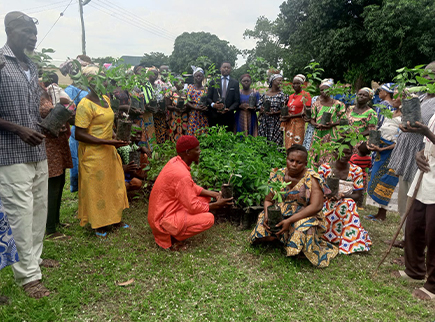The Joe-Bailor NGO, a Non-governmental Organisation, has launched a Baobab seedling distribution programme as part of efforts to promote commercial Baobab cultivation to help enhance local economies and promote women’s empowerment.
The initiative aimed at building a future where Baobab will no longer be seen as a wild and neglected tree, but as a strategic dryland crop of high economic and nutritional value.
Mr David Nibe, the Executive Director of Joe-Bailor NGO, in a speech read on his behalf at the project launch at Tanchara in the Lawra Municipality, expressed optimism in the economic transformative power of Baobab among the people, especially women and youth.
He said the NGO was laying the foundation for an inclusive, ethical, and dignifying Baobab economy through improved grafted Baobab seedlings, processing hubs, support for farmers and access to international markets.
The NGO distributed grafted early fruiting Baobab seedlings to farmer cooperatives in the Tanchara area, with about 1,500 seedlings expected to be distributed to farmers in the area.
The programme is expected to be launched across northern Ghana.
“Baobab is our opportunity crop. It is climate-resilient, drought-tolerant, and entirely useful. The fruit pulp is rich in Vitamin C. The seeds yield valuable oil for cosmetics and food.
The leaves are nutritious for both people and animals. Even the bark and wood have traditional, medicinal, and ecological uses,” Mr Nibe said.
He explained that the demand for Baobab was high in Europe, the US and Asia for super-foods, plant-based drinks, organic cosmetics, and ethical ingredients, with its global market value estimated at over USD7.2 billion in 2020 and USD10.2 billion by 2027.
Mr Nibe observed that with appropriate policy support, Ghana, especially the north, could lead Africa’s Baobab revolution.
“While empowering rural women through this initiative, Joe-Bailor shall also promote social safeguards, including the elimination of child labour, ensure gender equity, and respect for human rights in farming communities,” he explained.
Mr Nibe indicated that despite the promised benefits of the tree, barriers, including dependence on Baobab from the wild, hindered the attainment of its full economic potential.
A team of researchers from the Ho Technical University, in the Volta Region, led by Professor Kenneth Fafa Egbadzor, had engineered the Baobab seedlings to fruit within four years instead of the conventional fruiting period of 10 years and beyond.
In a speech read on his behalf, Prof Egbadzor indicated that research on Baobab at the University began in 2018, and the first seedling was planted in 2019, which began fruiting in 25 months.
He said the breakthrough in the Baobab research attracted international interest from researchers in South Africa, Finland, Britain, and Germany, which affirmed the immense potential of the Baobab tree.
He appealed to the donor community, including the government, to support the initiative saying, “It has the potential to become a vital cash crop, contributing to food security, biodiversity and climate resilience.”
Naa Naalu-Kuyi Waale II, the chief of Tanchara, commended the research team and the Joe Bailor NGO for introducing the community to the economic benefit of Baobab, expressing optimism about its potential impact on the lives of the people.
Stakeholders at the launch included representatives from the Babile Agricultural Research Station, Upper West Regional Director of Cooperatives, representatives of the Tree Crops Development Authority and the Lawra Municipal Assembly.
Categories
Editor's Pick
Promoting Baobab economy: NGO launches Baobab seedling distribution programme

